| Srl | Item |
| 1 |
ID:
083605


|
|
|
| 2 |
ID:
085943
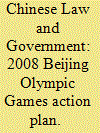

|
|
|
|
|
| Publication |
2008.
|
| Summary/Abstract |
We shall focus on preventing and controlling atmosheric pollution and on protecting the sources of drinking water and bring about a marked improvement in the quality of the urban environment and the state of the ecology by means of such measures as readjusting the conomic structure, enhancing high-quality and clean energy sources, setting strict standards for the emission of pollutants, and strengthening environment protection and construction.
|
|
|
|
|
|
|
|
|
|
|
|
|
|
|
|
| 3 |
ID:
144545
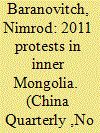

|
|
|
|
|
| Summary/Abstract |
In May 2011, Inner Mongolia experienced the most serious ethnic unrest in the region for 30 years. In this article, I explore the broader context that led to the eruption of the protests, with a particular emphasis on environmental issues. My aim is to explain why environmental issues occupied such a prominent position in the protests, and how these issues were connected to ethnicity. After discussing the material and practical implications of grassland degradation for Mongolian herders, I analyse the symbolic implications of this environmental crisis for the Mongolian educated elite, who have linked environmental issues to ethnic politics and identity. I argue that in the last 20 years or so, Mongolian intellectuals have developed a highly ethnicized environmental discourse, and that this discourse played an important role in informing the 2011 protests. My analysis focuses on this discourse as it is manifested in the domains of art, academia and daily discourse.
|
|
|
|
|
|
|
|
|
|
|
|
|
|
|
|
| 4 |
ID:
022531
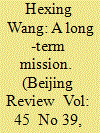

|
|
|
|
|
| Publication |
Sept 26, 2002.
|
| Description |
8-11
|
|
|
|
|
|
|
|
|
|
|
|
|
|
|
|
| 5 |
ID:
141776
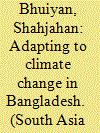

|
|
|
|
|
| Summary/Abstract |
Climate change poses a serious threat to humanity in developed and developing countries and is already affecting South Asia. This study examines the role that good governance plays for adapting to climate change in Bangladesh, arguing that lack of good governance in Bangladesh risks reducing adaptation preparedness to climate change in the country. There is evidence, mainly because of geophysical risk factors, to support arguments that good governance has anyway limited capacity in relation to adaptation measures to climate change in countries like Bangladesh. The article argues that the current politico-economic situation makes it doubtful whether Bangladesh will achieve the fullest possible ability to ensure good governance for better adaptation to climate change in the near future.
|
|
|
|
|
|
|
|
|
|
|
|
|
|
|
|
| 6 |
ID:
076982


|
|
|
| 7 |
ID:
060145
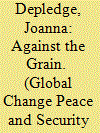

|
|
|
| 8 |
ID:
132170
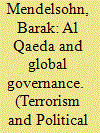

|
|
|
|
|
| Publication |
2014.
|
| Summary/Abstract |
In recent years, statements by al Qaeda leaders have included references to topics often associated with global-governance proponents' critique of the state. This article examines the organization's attitude toward symbols of global governance, giving particular attention to its view of the United Nations as the foundation for global governance, and to the manner in which al Qaeda approaches the central questions of environmental threats and human rights. The organization is seeking to insert itself into the discourse of global governance and use it in an instrumental manner; it focuses on anti-Western narrative and seeks to expose the existing order as designed by Western powers, particularly the United States, for self-serving reasons. However, the article argues, notwithstanding al Qaeda's reputation for sophistication in manipulating public opinion, the organization's references to global governance underscore the limitations its rigid ideology imposes on its messaging efforts. Even though adopting the global governance discourse is in line with the group's effort to improve its image, al Qaeda's extremist ideology limits its ability to take full advantage of the benefits this discourse offers.
|
|
|
|
|
|
|
|
|
|
|
|
|
|
|
|
| 9 |
ID:
080836
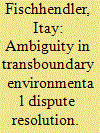

|
|
|
|
|
| Publication |
2008.
|
| Summary/Abstract |
Cooperation over transboundary environmental resources, water in particular, has been analyzed from various perspectives. Each study identifies the problems of cooperation differently and suggests different mechanisms to enhance it. Yet, the role of ambiguity, particularly significant in treaty design to resolve environmental disputes, has thus far been overlooked. Such a focus is warranted, since many international agreements regulating the use of natural resources are ambiguous in their schedule of resource delivery during crisis events or in their cost-sharing arrangements and may even include contradictory resource-allocation principles while remaining vague on how to settle the contradictions. This study aims to examine why, when, and how ambiguity is applied in agreements pertaining to natural resources, and water in particular. The Israeli-Jordanian peace agreement, which includes an annex on water-use regulation, is used as a case study. It was found that, under asymmetric power relations, when both sovereignty costs and uncertainty are high, several types of deliberate ambiguity were intentionally incorporated into the treaty. Some ambiguities allowed each side to present the treaty differently at home, thereby defusing domestic opposition, while others provided leeway to adjust the resource allocation during a future crisis without the need to renegotiate the treaty
|
|
|
|
|
|
|
|
|
|
|
|
|
|
|
|
| 10 |
ID:
067054
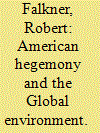

|
|
|
| 11 |
ID:
074492
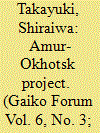

|
|
|
| 12 |
ID:
068409


|
|
|
| 13 |
ID:
079957
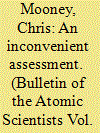

|
|
|
| 14 |
ID:
170175
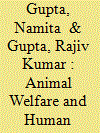

|
|
|
|
|
| Summary/Abstract |
India’s large stray dog population, estimated to be about 25 million, poses substantial risks to human health, motivating some civic bodies to employ cruel methods to control dog populations. This article argues that while human health is certainly a priority, it is also important to consider animal welfare and to handle dog population control measures without causing unnecessary animal suffering. Triangulating the issues of rabies control, dog population management and state intervention, the article identifies recent practical difficulties in local management of dog population control laws and policies in India’s model city of Chandigarh. Based on a survey of local opinions, this shows how rising human–animal conflicts require new ways of handling existing challenges.
|
|
|
|
|
|
|
|
|
|
|
|
|
|
|
|
| 15 |
ID:
143404
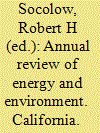

|
|
|
|
|
| Publication |
California, Annual Review, 2000.
|
| Description |
xiii, 857p.hbk
|
| Contents |
Vol. 25, 2000
|
| Standard Number |
0824323254
|
|
|
|
|
|
|
|
|
|
|
|
Copies: C:1/I:0,R:1,Q:0
Circulation
| Accession# | Call# | Current Location | Status | Policy | Location |
| 044621 | 333.79/SOC 044621 | Main | On Shelf | Reference books | |
|
|
|
|
| 16 |
ID:
023376
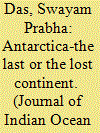

|
|
|
|
|
| Publication |
Aug 2002.
|
| Description |
171-187
|
|
|
|
|
|
|
|
|
|
|
|
|
|
|
|
| 17 |
ID:
117658
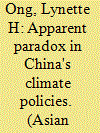

|
|
|
|
|
| Publication |
2012.
|
| Summary/Abstract |
China, the world's largest energy consumer and greenhouse gas emitter, appears to have contradictory climate policies. While aggressively pursuing a renewable energy policy, Beijing is weak on a commitment to emissions reduction. The "paradox" can be reconciled on the basis of China's priority for growth, which is critical in ensuring the Communist Party's grip on power.
|
|
|
|
|
|
|
|
|
|
|
|
|
|
|
|
| 18 |
ID:
067232
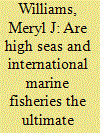

|
|
|
| 19 |
ID:
055860
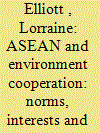

|
|
|
| 20 |
ID:
074353
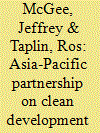

|
|
|
|
|
| Publication |
2006.
|
| Summary/Abstract |
The Asia-Pacific Partnership on Clean Development and Climate (AP6) has been marketed as an innovative new approach to international climate change policy that is complementary to the existing Kyoto regime. It is important to closely examine these claims of complementarity, given the two nations that were central to the formation of the AP6, the United States and Australia, have both expressly repudiated the Kyoto process. The difficulty involved in this exercise is in separating political rhetoric regarding complementarity from the reality of how the AP6 will likely impact upon the effectiveness of the Kyoto regime. This article discusses the AP6 and the various claims as to complementarity with Kyoto made during its formation in July 2005 and inaugural meeting in January 2006. For the purpose of analyzing these claims of complementarity five key features of the content of the AP6 are identified for comparison with Kyoto. Stokke's theory of regime interplay is used to assess how each of the five key features of the AP6 will likely impact upon the effectiveness of Kyoto. This analysis indicates that at fundamental levels of regime interaction the AP6 has significant potential to obstruct the effectiveness of Kyoto as currently framed. The conclusion to be drawn from this analysis is that the claims by AP6 parties as to complementarity with Kyoto are only defensible at a shallow ideational level with significant obstruction likely at more fundamental levels of regime interaction. The reality is that the AP6 offers a competing regime in international climate change policy that at the very least has significant potential to affect the future shape of Kyoto.
|
|
|
|
|
|
|
|
|
|
|
|
|
|
|
|